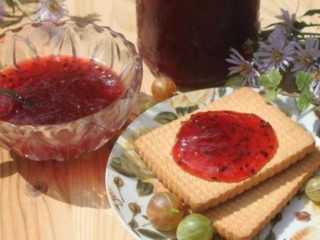Content
Recipes with rose hips for the winter are in the piggy bank of every zealous housewife. The fruits of this culture are a real storehouse of vitamins necessary to maintain immunity, especially during seasonal colds.
Cooking methods and what can be done from rose hips for the winter
There are many ways of harvesting this valuable berry for the winter without losing its beneficial properties. They make wonderful jam, jam and syrup from it. Rosehip marmalade is no less tasty. Most recipes contain only two to three ingredients. Compote is brewed from this representative of the Rosy family, berry juice is mixed with juices of fruits and vegetables, thus preparing healthy mixes and cocktails.
One of the most common methods of harvesting rose hips for the winter is by freezing them. Since the culture does not undergo heat treatment, it retains almost all vitamins and valuable nutrients. Before freezing, the fruits are separated from the sepals, washed, dried and only after that they are laid out in containers and bags, then sent to the freezer.

Defrost rose hips before eating
Another popular way of harvesting for the winter is drying. The fruits are pre-sorted out, removing rotten and affected specimens. Then they are evenly laid out in one layer on newspapers or dry cloth. Dry rose hips in a well-ventilated area. The main condition is the absence of direct sunlight, which can destroy some of the vitamins.
For several days, while the raw material dries up, the berries are regularly turned over to prevent mold from forming. Once they are dry, they are transferred to cloth bags or paper bags. Useful decoctions and compotes are obtained from dry blanks.
Selection and preparation of ingredients
They begin to harvest rose hips for the winter from the end of August. It is at this time that most varieties are harvested. You can determine the degree of ripeness by the color and structure of the fruit. A bright red hue and a slightly crumpled skin indicate that the harvest is ripe.
Rosehip harvesting can be continued until the first frost. Harvest in gloves and special suits that protect the skin from small cuts and scrapes.
After picking, the berries are sorted out, the sepals and stalks are cut with kitchen scissors. Then they are dried using paper or textile towels and an acceptable recipe or preparation method is chosen.

Healthy tea is brewed from rosehip flowers
In addition to fruits, wild rose leaves and flowers are harvested for the winter. They can be dried or frozen. Flowers are harvested in June and leaves in July - August.
How to properly prepare a rosehip at home for the winter
A variety of rosehip blanks for the winter at home will allow everyone to find the best option for a tasty and healthy treat. Children especially love marmalade and compotes, while adults will appreciate jams, syrups and tonic teas.
Jam
Rosehip jam is just as healthy as its alternative raspberry recipe. This is an excellent tool not only for treatment, but also for the prevention of ARVI.
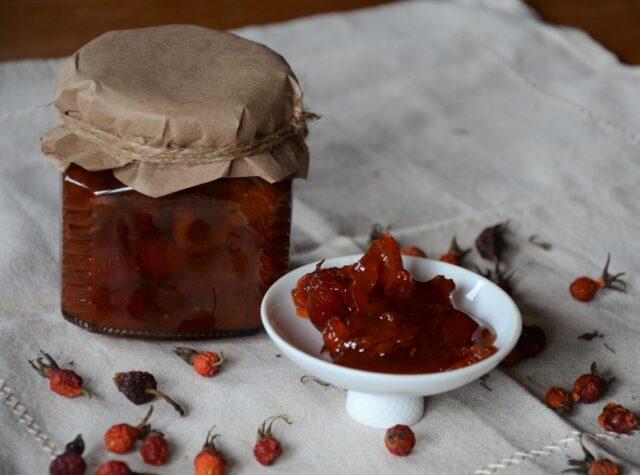
Jam is the most popular type of wild rose harvesting for the winter.
Would need:
- berries - 1 kg;
- sugar - 1 kg;
- water - 1 l.
Steps:
- Rinse the main raw material well, cut in half and remove the seeds.
- Berries can also be scalded with boiling water.
- Send all the ingredients to the saucepan and put it on low heat.
- Bring the mixture to a boil, remove the pinkish film that appears.
- Simmer for another 5 minutes, without ceasing to interfere.
- Remove the jam from the stove and let it brew for 7-8 hours.
- Bring the mixture to a boil and simmer for 5 minutes over low heat, not forgetting to stir.
- Sterilize the jars, pour the jam into them and roll up the lids.
This recipe allows you to preserve some of the vitamins and at the same time does not caramelize sugar, due to which the final product retains its beautiful reddish-orange color.
Compote
This recipe is a great vitamin drink option that makes a healthy alternative to lemonades and store-bought juices. In addition to rose hips, you can additionally use almost any berries and fruits in the recipe.
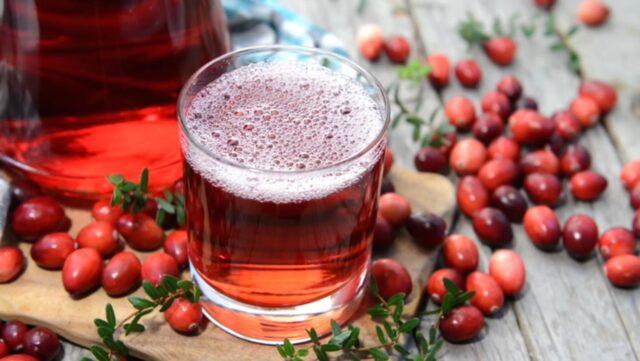
Rosehip blanks are very fond of children.
Would need:
- berries - 200 g;
- water - 3.5 l;
- sugar - 100 g;
- citric acid - 4 g.
Steps:
- Place the washed fruits in a saucepan, add water.
- Bring everything to a boil.
- Add sugar and simmer for 15 minutes.
- At the end of cooking, add citric acid, mix well and pour the compote into sterilized jars.
- Roll up the lids.
Rosehip, cranberry and apple compote is especially tasty.
Syrup
Rosehip syrup is a vitamin preparation that can be found in any pharmacy. But it will be much more economical if you make it at home. A syrup recipe requires only three ingredients.
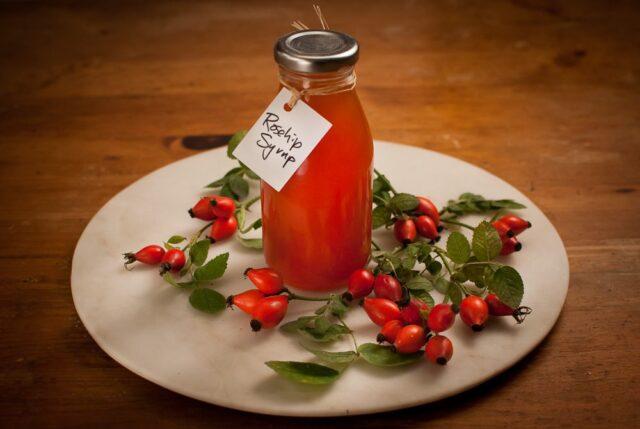
Rosehip syrup can be added to tea instead of sugar
Would need:
- rose hips - 1 kg;
- water - 1.5 l;
- granulated sugar - 1.5 kg.
Workpiece preparation process:
- Wash the rosehip thoroughly, remove the seeds.
- Scroll the fruits through a meat grinder or interrupt in a blender.
- Cover with water and bring to a boil.
- Simmer the mixture over low heat for no more than 10 minutes. Stir constantly.
- Pour sugar into the syrup and cook for another 30 minutes, not forgetting to stir the contents of the pan.
- Pour the hot workpiece into sterilized jars or bottles, close the lids and allow to cool at room temperature.
Store syrup in the refrigerator or basement.
Jam
Thick jam can be used as a breakfast addition or pie filling. You can enhance the taste and useful properties of the product by introducing additional ingredients into the recipe, for example, lingonberries or cranberries.
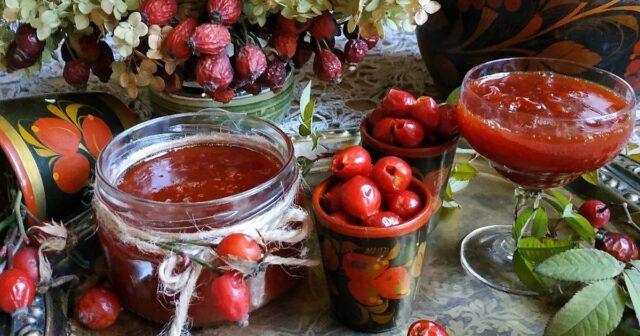
The combination of rose hips and cranberries in one recipe - a loading dose of vitamin C
Would need:
- rose hips - 1 kg;
- cranberries - 200 g;
- sugar - 800 g
Workpiece preparation process:
- Wash the raw materials well, then pour cold water and leave for 15-20 minutes.
- Remove the seeds from the rosehip and grind it together with the cranberries in a meat grinder or blender.
- Send the mixture to a saucepan, bring to a boil and add sugar (gradually).
- Cook the jam until the desired thickness for 25-30 minutes.
- Pack the hot product in sterilized jars, allow to cool and send for storage.
Rosehip jam can be a beautiful and very useful addition to any gift.
Marmalade
One of the most popular children's delicacies is marmalade. Its recipe is not difficult. This preparation for the winter is in great demand among mothers who want to increase the immunity of babies in a natural way.
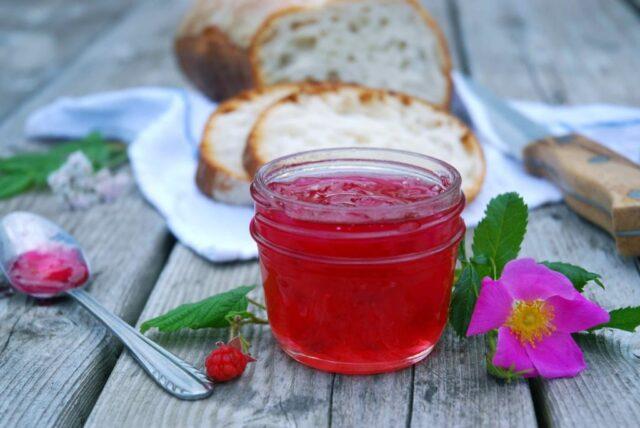
In the season of colds, the usual berry jam should be replaced with rosehip marmalade.
Would need:
- rose hips - 1 kg;
- granulated sugar - 700 g;
- water - 200 ml.
Steps:
- Pre-clean the fruits of stalks and sepals, wash, remove seeds from them.
- Pour over water and simmer over low heat until completely softened.
- Rub the mixture through a fine sieve, add sugar and put it back on the fire.
- Cook until thick.
- Pour the hot product into sterilized jars, roll up the lids and send to cool for a day.
You can add orange zest to your marmalade recipe to enrich your palate.
Juice
Another useful preparation for the winter is rosehip juice with honey. In addition to the large amount of vitamin C, folic acid is also present, which prevents the development of tumors.
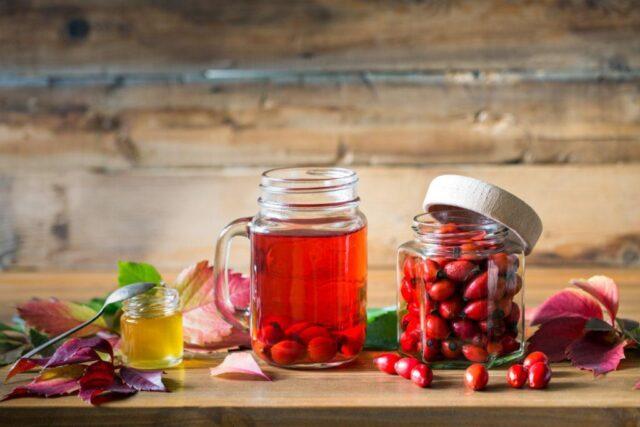
Rosehip with honey is contraindicated for allergy sufferers
Would need:
- fruits - 1 kg;
- honey - 250 g;
- water.
Workpiece preparation process:
- Remove seeds from pre-processed berries.
- Send them to a saucepan, add 200 ml of water and keep on low heat until softened.
- Rub the rose hips through a fine sieve.
- Add boiled water to the finished mixture in a 1: 1 ratio.
- Bring everything to a boil.
- Add honey.
- Cook for another 4-5 minutes.
- Pour the finished product into jars, roll up the lids and send to cool upside down.
It is better to store the juice in the basement or refrigerator.
Conclusion
Recipes with rose hips for the winter are used not only to fight colds, but also as a means of increasing immunity. They have practically no contraindications and are especially useful for children and the elderly.






